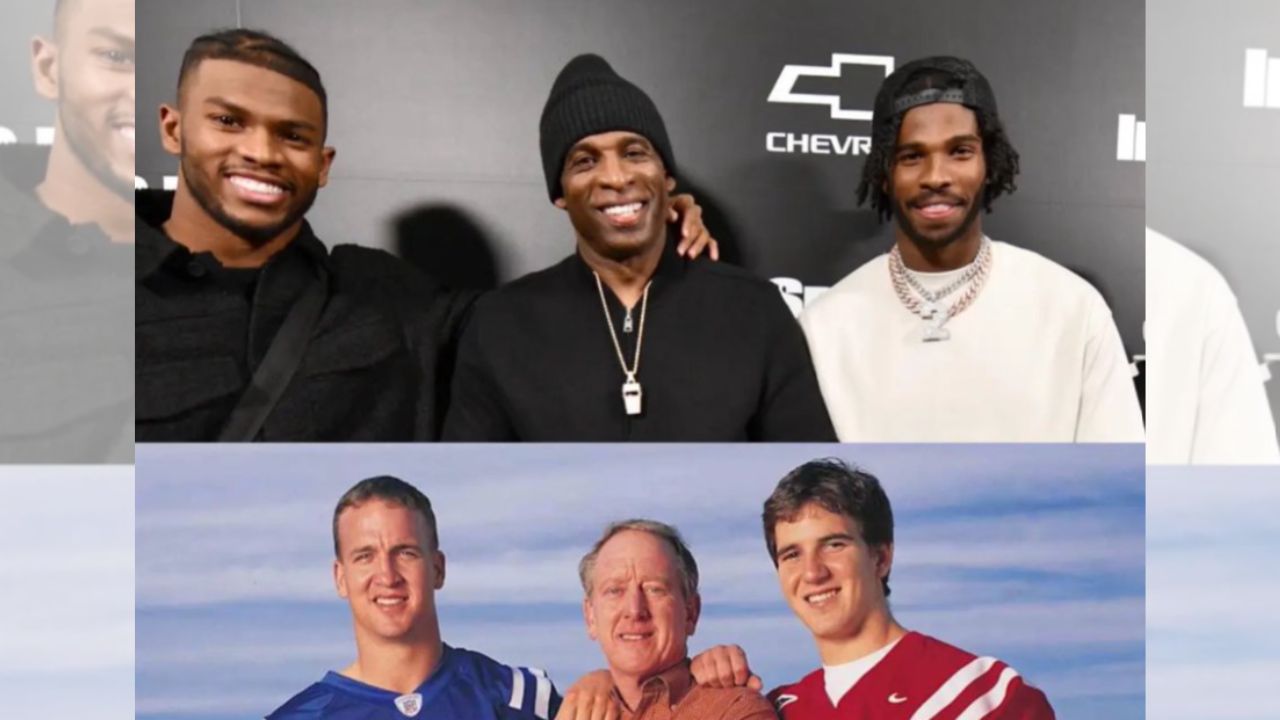On April 26, 2025, a viral X post by @mymixtapez reignited a heated debate about fairness and racial bias in the NFL draft, spotlighting Colorado Buffaloes quarterback Shedeur Sanders and drawing comparisons to the Manning family’s draft maneuvers decades ago. The post juxtaposed two images: one of Deion Sanders with his sons Shedeur and Shilo, and another of Archie Manning with his sons Peyton and Eli. Accompanying the images was a pointed caption from an account named TRUMPSHON: “It’s cool when they do it. It’s a problem when we do it.” The post, which garnered significant attention with replies ranging from support to skepticism, has fans and analysts calling out what they perceive as the NFL’s hypocrisy. But is this a case of racial bias, or are there other factors at play?
The Sanders Family and the 2025 NFL Draft
Shedeur Sanders, once projected as a top-10 pick in the 2025 NFL draft, became a lightning rod for controversy when he fell out of the first round entirely. According to a report by The Guardian on April 25, 2025, the Jacksonville Jaguars, who held the first overall pick, passed on Sanders in favor of USC’s Jaxson Dart, citing concerns over Sanders’ attitude and the potential influence of his father, NFL legend and Colorado coach Deion Sanders. Shedeur’s draft stock took a hit despite his impressive college stats—over 3,000 passing yards and a 70% completion rate in his final season at Colorado—numbers that typically signal a high draft selection for a quarterback.
Deion Sanders has been vocal in defending his son, a stance that has both supporters and critics. In a February 2025 appearance at the Super Bowl LIX NFL Honors in New Orleans, Deion was seen alongside Shedeur, exuding confidence in his son’s future. However, Shedeur’s brash demeanor and comments, such as his dismissive response to a former teammate in The Athletic (April 26, 2025), raised red flags for NFL front offices. Some teams reportedly feared that Deion’s larger-than-life presence could loom over Shedeur’s career, especially if he landed with a high-profile franchise like the New York Giants.
The Manning Family Precedent
The X post draws a direct comparison to the Manning family, specifically Eli Manning’s draft saga in 2004. Eli, drafted first overall by the San Diego Chargers, famously refused to play for the team, forcing a trade to the New York Giants. According to a Sporting News retrospective from February 6, 2025, Eli’s decision was influenced by concerns about the Chargers’ organizational dysfunction, a sentiment reportedly fueled by his agent Tom Condon and even his brother Peyton’s teammate Ryan Leaf, who had a disastrous stint with San Diego. Eli later clarified on the 10 Questions with Kyle Brandt podcast in 2021 that the decision was his own, not orchestrated by his father Archie, though public perception at the time suggested otherwise.
Similarly, Peyton Manning, drafted in 1998, had his own draft preferences, with Archie openly advocating for his son to avoid certain teams. The Mannings’ actions were met with criticism—Peyton’s draft process was controversial, and Eli’s trade demand was labeled as entitled by some—but both quarterbacks went on to win Super Bowls, validating their decisions in the eyes of many. As
@JohnRocha pointed out in a reply to the @mymixtapez post on April 27, 2025, “It was a HUGE controversy when they pulled this shit and they got raked over the coals for it.” The Mannings faced scrutiny, but their legacy as NFL royalty often overshadows the initial backlash.
Racial Bias or Different Circumstances?
The core of the @mymixtapez post’s argument is that the Sanders family is being judged more harshly than the Mannings for similar behavior, hinting at racial bias. This isn’t a new critique of the NFL draft process. A 2022 study published in the Journal of Economics, Race, and Policy examined discrimination in the NFL draft, noting that franchise selectors make rank-order judgments based on noisy signals of future productivity—signals that can be tainted by racial bias. The study highlighted the Wonderlic test, a cognitive assessment used until 2022, as a controversial metric that often disadvantaged Black players due to cultural biases in its design. Although the NFL discontinued the Wonderlic in 2022 after studies showed it had little predictive value for player success, the broader issue of biased evaluation persists.
Shedeur Sanders’ draft fall aligns with this narrative. ESPN’s Ryan Clark, in a March 14, 2025, article on SI.com, suggested that racial bias might be influencing Shedeur’s draft stock, pointing to a history of Black quarterbacks being scrutinized more heavily than their white counterparts. Clark’s comments echo the experiences of players like Lamar Jackson, who faced questions about switching positions despite a stellar college career, a scrutiny rarely applied to white quarterbacks like Eli Manning.
However, replies to the @mymixtapez post offer alternative perspectives.
@AragornWisehart noted on April 27, 2025, that the first five picks in the 2025 draft were all Black players, including a Black quarterback at No. 1, arguing that Shedeur’s fall was more about his “attitude and potential cancer on the team” than race.
@CarterSpeer echoed this on April 27, 2025, stating, “The discrepancy here isn’t race but talent level.”
@AndreEazy added a layer of skepticism, commenting, “Trying to call racism in a league that’s like 80 percent black is crazy work ngl,” highlighting the NFL’s predominantly Black player base as evidence against systemic racial bias in this context.
Attitude, Talent, and the Weight of Legacy
One key difference between the Sanders and Manning cases lies in their public personas. The Mannings, while assertive, were not perceived as “cocky” in the way Shedeur has been described.
@TrevorBoyd87 replied to the X post on April 27, 2025, saying, “They weren’t cocky as fuck. You are.” Shedeur’s confidence—some call it arrogance—has been a double-edged sword. His reposting of The Athletic’s article about a former teammate, accompanied by a dismissive “I don’t remember him,” rubbed some the wrong way, as noted in the April 26, 2025, piece by The Athletic. In contrast, the Mannings’ draft maneuvers were framed as strategic, not personal.
Talent evaluation also plays a role. The Mannings were seen as can’t-miss prospects—Peyton and Eli were both No. 1 overall picks, and teams desperately wanted them. Shedeur, despite his numbers, faced questions about his ability to translate to the NFL level, compounded by concerns about his father’s influence. As
@JohnRocha pointed out, “The difference is that other teams WANTED those QBs and they went on to win Super Bowls. Let’s see what happens with Shedeur… he’s gonna have a chance to deliver the greatest fuck you ever to the NFL or validate why teams didn’t select him until the 5th round.”
The Broader Implications
The @mymixtapez post, while polarizing, taps into a larger conversation about equity in the NFL. The league has made strides toward diversity—70% of players are Black, and the 2025 draft’s early picks reflect that—but systemic issues linger. The 2022 study on draft discrimination underscores how even marginal biases in evaluation can have significant impacts, particularly in a league where draft position dictates rookie contracts and early career opportunities.
For Shedeur Sanders, the 2025 draft may be a defining moment. If he succeeds, he could silence his critics and prove that the NFL’s hesitancy was misguided. If he struggles, it might validate the concerns about his attitude and readiness. Either way, the comparison to the Mannings highlights a persistent double standard in how confidence and agency are perceived in the NFL, often along racial lines.
As the dust settles on the 2025 draft, one thing is clear: the conversation about fairness, bias, and legacy in the NFL is far from over. Shedeur Sanders, much like Eli Manning before him, now has the chance to write his own story—whether as a trailblazer who overcame adversity or as a cautionary tale of unmet expectations. Only time will tell.

